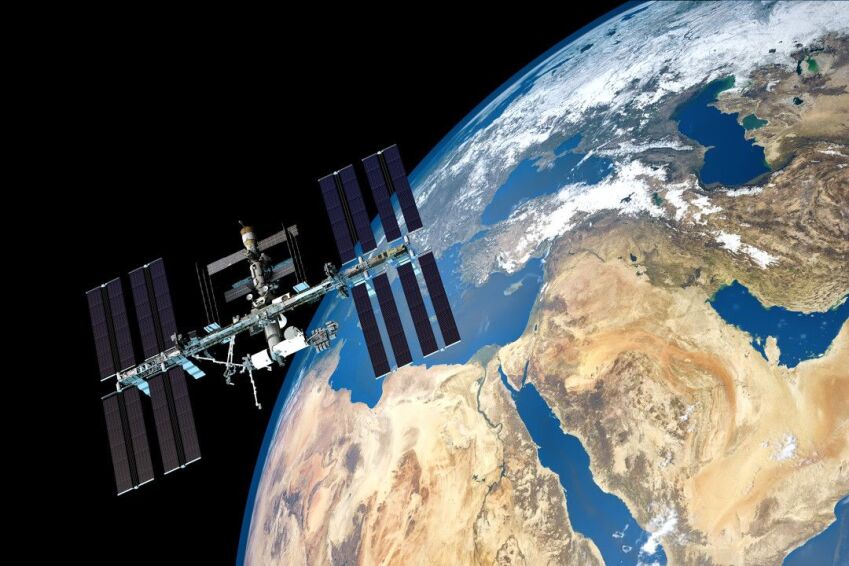 Aktualitas
Aktualitas 
Alpha mission: with eyes full of stars!
After two days of delays due to bad weather, the Alpha mission, with French commander Thomas Pesquet on board, left Florida on 24 April to reach the International Space Station. This is just what France needed to dream of stars!
“Good mission and thank you for making us dream”, tweeted French president Emmanuel Macron to French astronaut Thomas Pesquet as he left for space. The French space centre, the Centre National d’Etudes Spatiales (CNES), pursues this dream by publishing a comprehensive article on this event, and invites us to relive the astronauts’ arrival in the ISS. The Conférence des Présidents d'Université (CPU), on its part, is dedicating its research newsletter to university laboratories involved in space research.
Intense emotion
Astronaut Thomas Pesquet arrived in the International Space Station on Saturday 24 April at 1:45 p.m. (French time), a “moment of intense emotion” that the CNES encourages us to see or watch again.
In 2021, this will be the second time that Thomas Pesquet will spend six months on board the ISS, which is described as “a spacecraft the size of a football pitch”. The agency qualifies the International Space Station, as “a wonderful example of cooperation” which has been bringing together since 1998 about a dozen European countries, the United States, Japan and Canada “in one of the greatest partnerships in the history of science”. It is a “human outpost in orbit around the Earth” and “a springboard for future space exploration missions”. So the dream has only just begun!
A giant lab
The Alpha mission, which happens in the wake of the Proxima mission, is indeed the site of many experiments. Although the astronauts from the various countries that make up the mission are not all scientists, says the CNES, “we can say that the International Space Station is a huge laboratory. Unique in its kind, this microgravity lab allows science to be confronted with the absence of gravity over longer periods of time”.
Gravity, the CNES explains, is a determining factor in all human actions: “Removing it from the equation improves our understanding of natural occurrences”. On board the space station, “the rules that govern sedimentation, buoyancy and convection do not apply”. The astronauts on board live in “microgravity” and their “offgravity” laboratory offers the opportunity “to perform experiments that are simply not possible on Earth”. The crew can conduct “cutting-edge research, test new technologies and push the limits of our knowledge”. And the dream continues...
Universities on board the ISS
In any case, it is this knowledge that the Conference of University Presidents (CPU) has chosen to highlight by dedicating its newsletter L'Instant Recherche to “universities boarding the International Space Station”. The CPU asks the question: “What is the purpose of space and manned flights?” ". This is a legitimate question to which science and researchers “are providing sometimes surprising answers, through unprecedented experiments”.
Four articles describe these experiments. First, a study on the behaviour of foam on board the ISS by researchers from the University of Paris-Saclay, Sorbonne University and the Gustave Eiffel University. Then, there is the Eklo experiment, a sensory capsule designed to link astronauts to the Earth, by students from the University of Toulouse III and the Nantes Atlantique School of Design. And also: LUMINA, a fibre-optic dosimeter designed especially for the ISS by the Hubert Curien laboratory at the University of Saint-Etienne, as well as the ESA Giant Fluctuations and MAP TechNES projects, led by the University of Pau, which focus on the behaviour of fluids in zero gravity. In other words, in these laboratories, the dream has already taken shape.
Looking for new European astronauts
It is in this atmosphere that the European Space Agency is launching, until 28 May and for the first time in ten years, a recruitment campaign for new astronauts. France is taking part in this campaign to select candidates who must be nationals of one of the 22 European space member states. Candidates can submit their applications online, and the selection process will end in October 2022 with the hiring of four to six astronauts. Enough to embrace your dreams and see the stars a little closer!
To know more:
- CNES website about the Alpha mission
- How to apply to the recruitment campaign for European astronauts
Photo credit: ©Sasa Kadrijevic - stock.adobe.com





Commentaires
Vous devez être connecté pour laisser un commentaire. Connectez-vous.